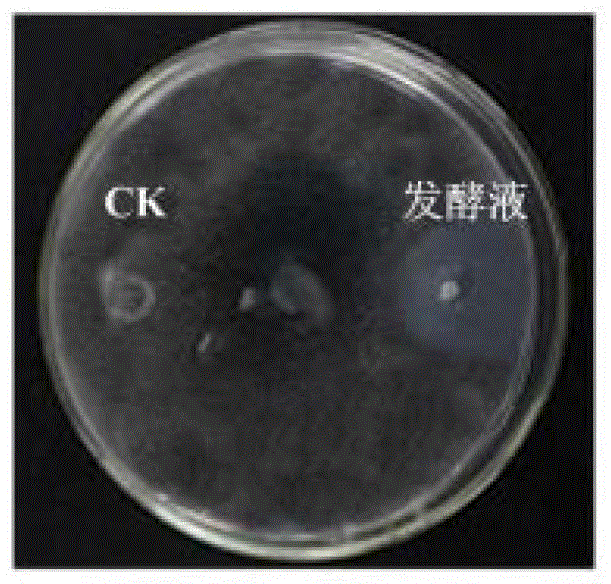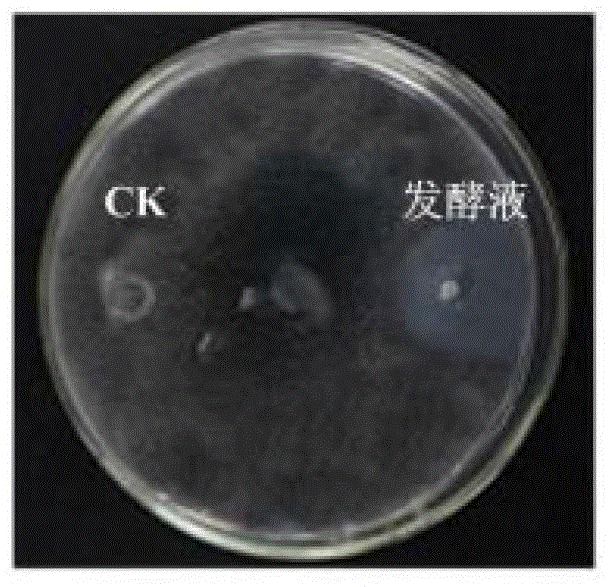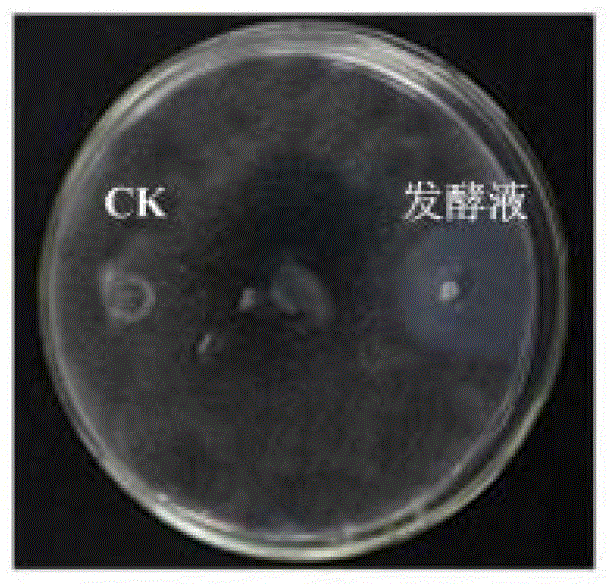Application of anti-mildew bacillus strain and antimicrobial product thereof in corn storage
A Bacillus and Bacillus subtilis technology, applied in the biological field, can solve the problem of no Bacillus antibacterial products, etc., and achieve the effects of ensuring food safety, improving food quality, and inhibiting the growth of molds
- Summary
- Abstract
- Description
- Claims
- Application Information
AI Technical Summary
Problems solved by technology
Method used
Image
Examples
Embodiment 1
[0057] Example 1 Screening of anti-mold Bacillus subtilis LPL-NM45
[0058] 1. Separation of Aspergillus niger, Penicillium oxalicum and Fusarium moniliforme
[0059] Aspergillus niger, Penicillium oxalicum and Fusarium moniliforme were isolated from corn samples. Separation method: Weigh 25g corn sample, add it to 225mL sterile normal saline, shake well to prepare a spore suspension, dilute it with sterile normal saline 10-1000 times, draw 0.1mL into a petri dish, and pour it into Cooled to 45 ℃ PDA medium, cultured at 28 ℃ for 3-5 days, pick a single colony plate streak purification, and identify, isolate Aspergillus niger, Penicillium oxalicum, Fusarium moniliforme.
[0060] 2. Use LB medium to isolate Bacillus from different samples
[0061] In order to ensure the diversity and safety of the obtained strains, try to consider selecting samples from relatively safe food and biological environments that may have more bacillus. The samples are Xinjiang roasted naan, thick soup, kiwi...
Embodiment 2
[0078] Example 2 Identification of Bacillus LPL-NM45 Producing Antibacterial Substance
[0079] 1. Morphological identification
[0080] Pick a small amount of the target strain Bacillus LPL-NM45 and streak it on the LB plate, culture it at 28°C for 20 hours, observe the morphology, shape, size, edge, surface, ridge shape, transparency, color of the colony and the culture medium, etc. of the single colony, etc. After culturing to 24h and 48h, microscopic examination, record the morphology of the bacteria.
[0081] After culturing in LB medium for 24 hours, the colony of strain LPL-NM45 has regular morphology, with wrinkled surfaces, neat edges, opaque, wet sticky, such as Figure 4 Shown. Under the microscope, the spores are slender and rod-shaped. The spores are elliptical, enlarged, and grow proximally, such Figure 5 Shown.
[0082] 2. Physiological and biochemical identification
[0083] Refer to the "Manual for Identification of Common Bacterial Systems" to conduct various physio...
Embodiment 3
[0099] Example 3 The control effect of the antibacterial product of Bacillus subtilis LPL-NM45 on mold during storage of high-moisture corn
[0100] 1. Inhibition and effect of antibacterial products of Bacillus subtilis LPL-NM45 on corn mold and its spores
[0101] 1.1 Extraction of antibacterial products of Bacillus subtilis LPL-NM45
[0102] Bacillus subtilis LPL-NM45 was inoculated into LB liquid medium and cultured at 37°C at 140 rpm for 48 hours to obtain fermentation broth. The fermentation broth was centrifuged at 10000 rpm for 12 minutes to obtain the fermentation supernatant, and solid ammonium sulfate powder was added to the fermentation supernatant. Saturation is 65%, 4℃, 200rpm, after stirring for 1h, placed in 4℃ refrigerator overnight, centrifuged at 10000rpm for 12min, discarded the supernatant, the precipitate was redissolved in phosphate buffer (25mM pH7.0) of 1 / 10 of the fermentation broth volume In the dialysis bag, the 3.5kDa dialysis bag was dialyzed. After the...
PUM
| Property | Measurement | Unit |
|---|---|---|
| Diameter | aaaaa | aaaaa |
Abstract
Description
Claims
Application Information
 Login to View More
Login to View More - R&D
- Intellectual Property
- Life Sciences
- Materials
- Tech Scout
- Unparalleled Data Quality
- Higher Quality Content
- 60% Fewer Hallucinations
Browse by: Latest US Patents, China's latest patents, Technical Efficacy Thesaurus, Application Domain, Technology Topic, Popular Technical Reports.
© 2025 PatSnap. All rights reserved.Legal|Privacy policy|Modern Slavery Act Transparency Statement|Sitemap|About US| Contact US: help@patsnap.com



